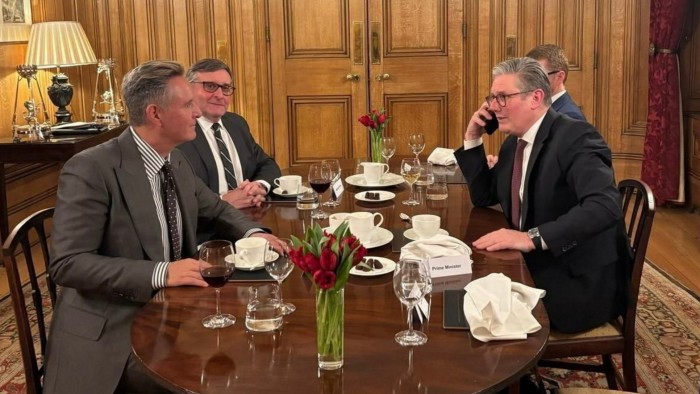Unlock the White House Watch newsletter for free
Your guide to what the 2024 US election means for Washington and the world
Sir Keir Starmer is seeking to form “a bridge” between Washington and Europe against a backdrop of deepening transatlantic tensions over Ukraine, trade, defence and free speech.
The UK’s prime minister is expected to attend a summit hosted by French President Emmanuel Macron on Monday to discuss a European approach to ending the war in Ukraine, amid signs US President Donald Trump is sidelining the continent.
Starmer is then expected to travel to Washington in the last week of February in an attempt to persuade Trump to fully involve European nations in Ukraine talks and to try to head off US tariffs.
The prime minister said this was “a once in a generation moment for our national security when we engage with the reality of the world today and the threat we face from Russia”.
He added: “The UK will work to ensure we keep the US and Europe together. We cannot allow any divisions in the alliance to distract from the enemies we face.”
Downing Street said it expected there to be another meeting of European leaders, including Ukraine’s President Volodymyr Zelenskyy, after Starmer returns from his talks with Trump.
Britain — like other European countries — is under fierce pressure from Trump to increase defence spending against a backdrop of sluggish growth and strained public services.
Starmer has committed to setting out “a pathway” to raise UK defence spending from 2.3 per cent of GDP to 2.5 per cent but has so far not said when that target would be met. Chancellor Rachel Reeves is attempting to hold spending at 2.3 per cent, as her fiscal plans come under severe strain.
The idea of a British “bridge” between Washington and Europe fell apart after Brexit, with US presidents often preferring to talk to Berlin or Paris along with EU leaders in Brussels.
But Starmer’s allies believe that Trump holds a positive view of Britain, which could be leveraged into political influence, even if vice-president JD Vance last week criticised the UK’s approach to free speech.
“I believe we in the UK can be a bridge between the US and Europe as we adjust to this new era,” Jonathan Reynolds, business and trade secretary, said on Sunday. “It’s certainly a new era.”
Reynolds told the BBC’s Laura Kuenssberg that Britain’s relatively high levels of defence spending, a balanced trade relationship and light touch regulation of artificial intelligence could work to the UK’s advantage.
“There’s definitely a view towards Europe and a different view towards us in the UK,” Reynolds said. “We’ve got a chance to play a constructive role.” On trade, he said the US saw Britain “in a different light”.
Lord Peter Mandelson, UK ambassador to Washington, said Britain should make a virtue of being “not Europe”. It remains to be seen whether this is wishful thinking on the part of Starmer, given Trump’s stated plan to levy tariffs across the board and Vance’s criticism of Britain last week.
Vance told the Munich Security Conference last week that “basic liberties of religious Britons, in particular” were under threat, criticising the prosecution of an anti-abortion protester.
Even if Starmer does persuade Trump to give Britain special treatment — for example on tariffs — that would complicate Starmer’s parallel attempt to “reset” relations with the EU, including removing trade barriers.
Trump said on Friday that Starmer had requested a meeting in Washington and said that the two leaders had “a lot good things going on”. He said the meeting would take place “very soon”, adding: “I think he wants to come next week or the week after.”
David Lammy, foreign secretary, has also urged the US not disengage from Kyiv, saying Washington should tie American business interests — including the defence and industrial sectors — into the future defence of Ukraine.
“That is what will make Putin sit up and pay attention, and that is what’s attractive to a US president who knows how to get a good deal,” Lammy said last week.
Read the full article here




